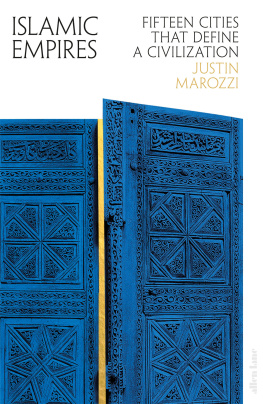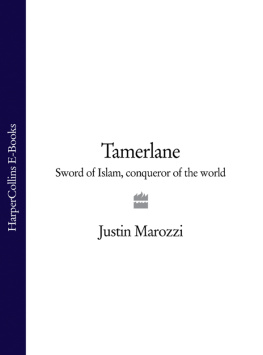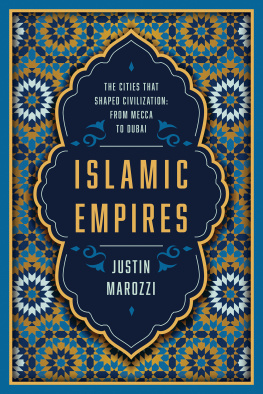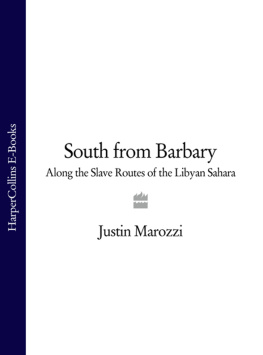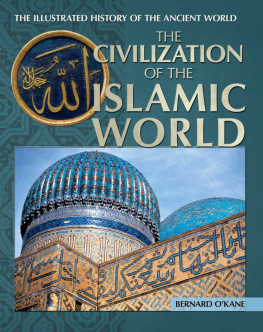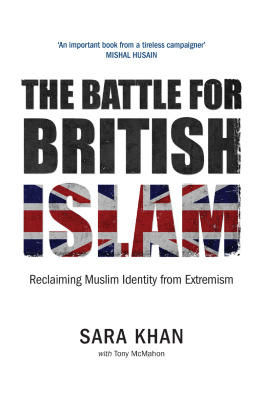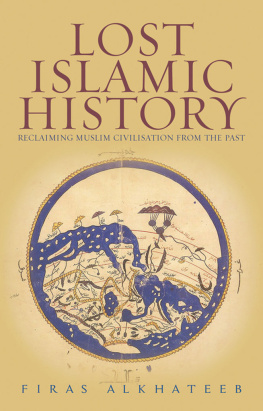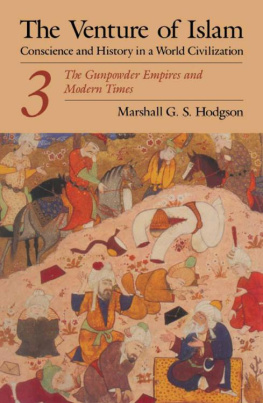Preface
Im embarrassed to be an Arab these days, a Tunisian friend said to me recently. Everywhere you look theres chaos, fighting, bloodshed, dictatorship, corruption, injustice, unemployment. The only thing were leading the world in is terrorism.
That is indeed much of the perception in the West today, as well as in the Arab world itself. But of course it is far from being the whole story and it wasnt always like this. A thousand years ago, Islamic civilization bestrode the world. For an Arab Muslim, pride in occupying the very summit of the global pecking order, rather than shame and embarrassment at languishing in its nether regions, was the order of the day. Many of the magnificent cities of North Africa, the Middle East and Central Asia were architectural, intellectual and economic wonders in their own right. From Damascus, Baghdad and Cordoba to Cairo, Fez and Samarkand, the capitals of successive Islamic Empires were famed and frequently feared across the world. They represented an exhilarating combination of military might, artistic grandeur, commercial power and spiritual sanctity. They were also powerhouses of forward-looking thinking in science, medicine, mathematics, astronomy, cartography, calligraphy, history, geography, law, music, theology, jurisprudence and philosophy, each metropolis a superbly humming engine room of innovation and discovery. Outgunned, out-peopled and out-thought, Christian Europe looked south and east with envy, dread and hostility. While Baghdad could boast of a population of about 800,000 in the ninth century, London and Paris by contrast were minnows of just 20,000 in 1100. Islamic cities, then, were the embodiment of a superior civilization.
The word civilization springs from the Latin civis, a citizen, which is in turn related to civitas, a city. From these etymological origins, it is only a short step to argue that a city civilizes it removes men and women from a savage, barbarian life and that without cities there is no such thing as civilization. It is within cities, rather than among deserts, wildernesses, steppes, mountains and jungles, however beautiful and spirit-soaring, that humankind has realized its greatest potential: excelling in the arts and sciences, exploring the human condition and leaving an indelible literary legacy.
When it comes to the geographical origins of civilization, however, Latin offers us little guidance. Our gaze must move 3,000 miles east of Rome, to what today is Iraq, and which for much of its millennial history Ancient Greeks knew as Lower Mesopotamia, the fertile, irrigated land between the life-giving Tigris and Euphrates rivers. It was here, from Sumerian times in the sixth millennium BC through the Babylonian, Assyrian, Achaemenid, Seleucid, Parthian, Roman and Sassanid periods, that successive empires, civilizations and great cities such as Akkad, Assur, Babylon, Ur, Uruk, Nineveh, Nippur and Nimrud first flourished. These ancient cities rose in mud-brick splendour from the Mesopotamian plain, lorded it over the world around them and wrote their names into posterity. Most had subsided into crumbling ruins by the time Islam arrived in the seventh century.
If Mesopotamia gave the world its first cities, the Islamic Empires that followed in the region bequeathed some of the most glorious and resplendent capitals ever seen. This book looks at fifteen of them, focusing on a single city in each of the fifteen centuries of Islam from the time of the Prophet Mohammed and the birth of the new faith to the present day. In its own way each has contributed decisively to the history of the Dar al Islam, or Muslim world.
Islamic Empires traces a history of this world through some of its greatest cities and during some of its most important and dramatic moments, focusing on what Herodotus, the fifth-century BC Father of History called great and marvellous deeds. It begins in the seventh century and ends in the twenty-first, with intermittent forays into the present day.
Our story necessarily starts in Mecca, where the history of Islam first began amid the parched Hijaz desert of Arabia, and which remains to this day the holiest place for the worlds 1.5 billion Muslims, the lodestar to which they turn five times a day in prayer. It is also unique within the Muslim world for prohibiting non-Muslims, a tradition fiercely upheld ever since the new faith seized it from pagan hands, and which is scrupulously maintained to this day. Unlike every other city in this book, it is by definition an exclusive city, a sanctuary of complete purity from which outsiders are excluded. It is, to that extent, an emblem of Islams superiority complex.
The surge of Arab horsemen out of the desert, blazing a trail of Islamic conquest during the seventh century, shook the world. From the Arabian Peninsula in the lifetime of the Prophet, the Islamic Empire rapidly spread north and west under the rule of his first four successors as caliph the Rashidun, or Rightly Guided, leaders Abu Bakr, Umar, Uthman and Ali. Its first great capital was Damascus, from where the Umayyad Dynasty (r. 661750) expanded Islamic dominions into one of the largest empires the world had ever seen, extending from the Atlantic Coast of North Africa and the Iberian Peninsula in the west to the mountains of Central Asia and the borders of China and India in the east.
After a revolution in 750 brought a vicious and bloody end to the Umayyads, they made way for the Abbasids, who reigned from their incomparable new metropolis of Baghdad, City of Peace, from 762 to 1258. For much of these 500 years, this was the pre-eminent city on earth, a marvel of opulent palaces, sky-filling mosques and madrassas (religious colleges), libraries, universities and research institutes crammed with some of the worlds finest, mostly Muslim, scholars, a sophisticated network of roads and canals, state-of-the-art hospitals and thriving markets. Baghdad was a quintessentially cosmopolitan capital in which art, music, wine-drinking and poetry (sometimes bawdy enough to shock modern readers) testified to the self-confident pluralism of Islam.
Over time the Islamic Empire fragmented. In 929, the emir or prince Abd al Rahman III (r. 92961) renounced his notional allegiance to Baghdad from distant Al Andalus and declared a rival caliphate in Cordoba. With throngs of high-minded scholars beavering away in its prodigiously stocked libraries during his reign, the Andalusian city became decus orbis, the ornament of the world.
Jerusalem moves to the centre of my narrative in the apocalyptic First Crusade of 1099, whose infamy lives on in many Muslim minds to this day. Known as Al Quds by Arabs, the city is scarcely less holy than Mecca within Islam and bears witness at once to humankinds reverence for religion and its often fatal predilection for competition and strife. Centuries of conflict, which continue today, have given it the unwished-for moniker of most contested city on earth.
After the ignominy and humiliation of the First Crusade at the climax of the eleventh century, we move to Cairo Al Qahira, The Victorious for more auspicious Islamic fortunes under the legendary Kurdish leader Saladin in the twelfth. The Crusaders were routed, Jerusalem was retaken, honour was restored. Sunni Islam and prestige were reinstated at the heart of the Muslim world.
Thousands of miles away at the other, western end of the Dar al Islam, one city stood out gloriously in the thirteenth century. Known as the Athens of Africa, Fez emerged under the Marinid Dynasty (r. 12441465) as a world-illuminating centre of learning to rival the Europe of Dante, Aquinas, Froissart, Bacon and Chaucer. To this day its sprawling medina, or Old City, remains the largest in the world and one of the most completely bewitching sights on earth.
In the fourteenth century, no city within the Islamic world could compete with Samarkand, Pearl of the East, nor could any Muslim leader match the mighty Turkic warlord Timur, better known in the West as Tamerlane. A one-man empire-builder who was undefeated in battle over four decades in the saddle, he turned Samarkand into a dazzling, blue-domed metropolis of peerless monuments admired across Asia. He also turned many of the continents finest cities, including several of those described here, into smoking wastelands surrounded by the dreadful, vulture-haunted towers made from the piled up decapitated heads of his enemies.

